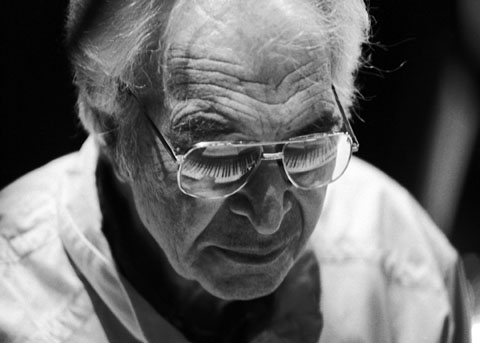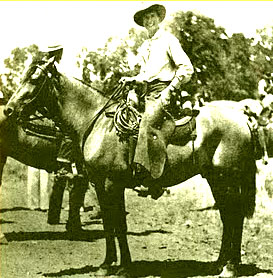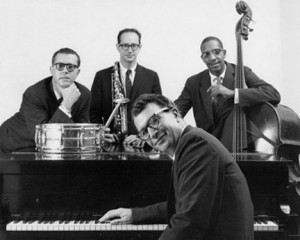
Everyone has heard of the famous jazz musician Dave Brubeck. What you probably don’t know is that he grew up on a ranch riding horses and working cattle. His father Howard “Pete” Brubeck was the manager of a 45,000 acre ranch in California – as well as a champion roper.
American Cowboy magazine recently interviewed Dave and asked if he was more famous than his father. “I just read a great book on the cowboys of Northern California. Part of the introduction mentions my father and reads, “Pete Brubeck was a wonderful roper, and he has a son that plays the piano.” I love that.
Now 80, Brubeck is still going strong, creating new music, playing to sell-out crowds. Hedrick Smith Productions and PBS bring you the first, full-length documentary of the celebrated Jazz legend on Sunday, Dec. 16 at 10 pm. The below text is from their website describing the program.
Ranch Years (Growing Up)
To those with a less musical ear, the clip-clop of horse’s hooves, the vibration of a gasoline engine and squeak of a water pump are just the simple noises of farm life. But to the young Dave Brubeck, they were not just the sounds that broke up the monotony of growing up on a ranch — they were the rhythmic building blocks that would form the foundation for some of his most famous jazz tunes. “Sure, you could be bored unless you have an imagination,” he says, “So I’d always be thinking musically when I had jobs to pump water or ride horseback. I’d lie there under the gasoline motor that was vibrating and I’m singing rhythms against that.”
While jazz and rumbling farm equipment may seem like an unlikely combination, the pairing captures the paradoxical essence of Dave’s childhood. Between the sounds of Chopin wafting from the family living room and the rough and tumble existence of life as a cattle wrangler, it’s safe to say that Dave Brubeck grew up in two different worlds. His father, Pete, was a cowboy and champion cattle roper, a gruff opposite to his cultured, sophisticated mother, Bessie, a student and teacher of classical piano.
When David Warren Brubeck was born on December 6, 1920, he was the baby of the family, the youngest of three sons. He grew up surrounded by music. His mother Bessie played piano all day and taught music at home in Concord, California, then a rural community outside of San Francisco. She frequently went into the city to listen to music and opera. When Dave was in first grade, she went to study classical music in England. She intended to pursue a career as a concert pianist, but missed her family so much that she returned home to California to be with her children, content to fulfill her musical appetite by teaching piano to local young people.
 Pete was a lifelong cattleman, known across California as a champion cattle wrangler, winning competitions at local rodeos. When Dave was twelve, the family moved to Ione, California, a farming area south of Sacramento. Pete became manager of the 45,000-acre Rancho Arroyo Seco ranch. They had over 8,000 head of cattle and hundreds of horses. Bessie moved, albeit reluctantly, and continued teaching, taking three pianos with her from Concord.
Pete was a lifelong cattleman, known across California as a champion cattle wrangler, winning competitions at local rodeos. When Dave was twelve, the family moved to Ione, California, a farming area south of Sacramento. Pete became manager of the 45,000-acre Rancho Arroyo Seco ranch. They had over 8,000 head of cattle and hundreds of horses. Bessie moved, albeit reluctantly, and continued teaching, taking three pianos with her from Concord.
“You gotta realize that my mother was a great musician and my father was a great cattleman, so you were pulled by these two things.” Dave says, “There was no way we could figure out why they got married. Sometimes I think it was fortunate because you had two completely different lifestyles all in one house.”
Dave was fascinated with his father and felt very close to him, yet he was drawn to the piano as well. He took lessons from his mom and started composing at age four. His instruction was short-lived, however — his father wanted to pass on his legacy, and with Dave’s two older brothers already on their way to becoming professional musicians, Pete saw Dave as his only hope. “I was the last son and my dad said, ‘This one is mine,’ to my mom – that I would be the one to follow in his footsteps.” So Dave gravitated toward ranching. He stopped taking lessons from Bessie, preferring to make up his own music and learning to play by himself. He would saddle up his horse Pedro, a gift from his father, and ride next door to visit his neighbor and friend, Bob Skully. There Dave would indulge his taste for playing music by banging away on the Skully’s old upright piano, playing popular tunes of the day with some innovative jazz rifts.
Dave helped around the ranch, earning about a dollar a day. He roped like his Dad but Bessie forbade him to try to difficult techniques, lest he injure his hands. Beyond that, Dave remembers, Pete treated his son the same as the rest of the ranch hands. “He expected you to be really tough…and if you complained to him, like you had no water all day long on a summer day where it’s just hot like you can’t believe…and you’d be so thirsty and if you said anything, he’d say ‘Pull a button off your shirt and put it in your mouth and then you won’t be thirsty anymore.’ And that was the end of it.”
Dave vaccinated and branded the cattle, chopped wood, and spent most of his day riding horses. Ironically, it was riding horseback that inspired Dave to think in a polyrhythmic jazz style. The steady gait of the horse would provide one rhythm and Dave would invent another rhythm to play against that. So even as Dave happily pursued life as a ranch hand, the music flowed inside his head.
The first inklings of Dave’s musical destiny came in junior high when he and Bob Skully would skip class and ride over to neighboring elementary schools to entertain younger children. By the time he was sixteen, Dave was already performing professionally, as a sideman playing honky tonk piano in the mining towns of the Sierra Nevadas. Dave recalls one such gig: “I remember playing in a place above McCollamy Hill way up in the mountains. And the rain was coming in on the piano ’cause the roof was full of holes. And I wanted to quit playing but the bandleader said ‘for God sake, keep playing.’ And you can’t imagine how wild these [guys] were. [They were] all lumbermen, guys working in the forest. So when they wanted to dance, you played.”
Pete allowed Dave to play, but with the understanding that work on the ranch came first. “[I’d] play maybe ’til 3 or 4 o’clock [in the morning],” Dave recalls, “and when I got home my dad would say ‘take off that damn tuxedo and put on your overalls. I need you.’ And then you’d go off on horseback.”
When Dave graduated from high school, Bessie wanted Dave to expand his horizons and go to college. But Dave was content to join Pete and make a life as a cattleman. They struck a compromise: Dave would attend the College of the Pacific in Stockton, California – but as a veterinary student, hoping to rejoin his dad on the ranch after graduation.
Dave Brubeck enrolled in the College of the Pacific (now the University of the Pacific) in 1938, three months shy of his 18th birthday, ready to study veterinary medicine.
 Brubeck might very well have continued down this path and become a cowboy like his dad, but, as he explains, fate intervened. “The music department was across the lawn from the science department,” he recalls. “And my zoology teacher said, ‘Brubeck, go across the lawn next year. Your mind’s not here.'” Dave took that advice and switched his major to music in his second year.
Brubeck might very well have continued down this path and become a cowboy like his dad, but, as he explains, fate intervened. “The music department was across the lawn from the science department,” he recalls. “And my zoology teacher said, ‘Brubeck, go across the lawn next year. Your mind’s not here.'” Dave took that advice and switched his major to music in his second year.
If you have problems seeing the video below click HERE
.youtube::_yExwkQYcp0::
